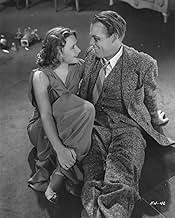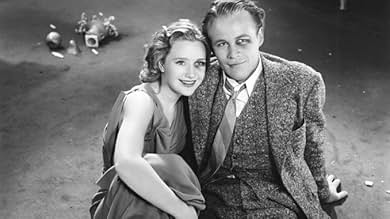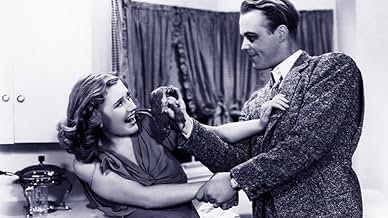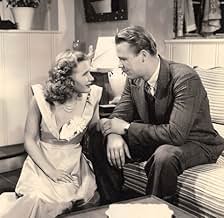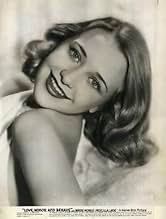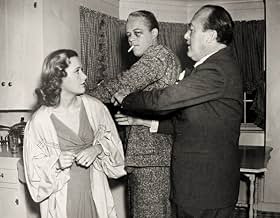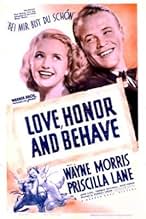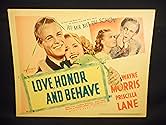A woman raises her son Ted to be a good loser, in effect creating a weakling who never asserts himself. Even after marrying his childhood sweetheart Barbara and assuming family obligations, ... Read allA woman raises her son Ted to be a good loser, in effect creating a weakling who never asserts himself. Even after marrying his childhood sweetheart Barbara and assuming family obligations, Ted cannot bring himself to fight for respect. The worm finally turns when Barbara starts ... Read allA woman raises her son Ted to be a good loser, in effect creating a weakling who never asserts himself. Even after marrying his childhood sweetheart Barbara and assuming family obligations, Ted cannot bring himself to fight for respect. The worm finally turns when Barbara starts stepping out on her Milquetoast husband, who then turns out to be not so passive after all... Read all
- Sally Painter
- (as Barbara O'Neill)
- Party Guest
- (uncredited)
- Party Guest
- (uncredited)
- Boy Playing with Young Ted
- (uncredited)
- Little Girl
- (uncredited)
Featured reviews
In the present, Mr. Morris and Ms. Lane meet each other as attractive young adults. Morris' parents are still concerned about his meekness. His father wants him to play a rough contact sport like football, but Morris plays tennis at Yale; his mother wants "mama's boy" Morris to be a doctor, but he lacks determination and interest. Childhood "sweethearts" Morris and Lane are very much in love, but his mild manner threatens their happiness. Aggressive Dick Foran (as Pete Martin) also desires Lane...
Lane sings a nice version of The Andrews Sisters' colossal introductory hit "Bei Mir Bist du Schoen" (1937), which put the singing sisters on the map. This is a well-structured story, but ends with a scene promoting violence; Lane's arousing "spanking" is fine, but the characters show visible wounds ("black eyes") resulting from an audibly vicious fight, which is celebrated by much of the cast. By the way, watch for Morris to lose the small hairpiece that covers his "bald spot" during the fight.
Equating contact sports and sex play with domestic violence scores no points.
*** Love, Honor and Behave (3/12/38) Stanley Logan ~ Wayne Morris, Pricilla Lane, Dick Foran, Thomas Mitchell
The conflict is resolved in an almost slapstick manner by the young marrieds (Morris, Priscilla Lane) that is steeped in just enough physical injury to make it unfunny and unromantic in the extreme. Given that none of the players from Mitchell on down seem to believe any of the lines they're spouting, and that the flat direction gives us nothing to appreciate in the acting or staging up to that point, it's almost a relief when this picture's final credits ("blame" might be more appropriate) unspool. (Even Dick Foran, who was accustomed to playing unsubtle lunkheads -- a role he later aspired to in real life -- looks uncomfortable here). And of course, the fact that it took four credited screenwriters to deliver the script for this 71-minute time-filler should be a warning to the unwary.
If you're looking for a good movie about marital conflict and resolution from this decade, see William Wyler's DODSWORTH. LOVE, HONOR AND BEHAVE is closer to Jiggs and Maggie, and painful to watch, especially given our awareness that everyone involved (including underlying author Stephen Vincent Benet, whose output included "The Devil And Daniel Webster") was capable of so much more than what we see here.
Trouble is this overly generous attitude causes problems for Ted as an adult, particularly with his love life where he doesn't try hard to win Barbara (Lane) despite how he feels. What he needs to do in so many words is 'to stand up for what you want'. So the idea, I believe, is a critique of being both overly generous as a personality trait and of the kind of upper class superiority that patronizes others.
I'm not surprised this was a Warner Bros. production since they were the blue-collar studio of the 30's. (In that regard, catch the revealing very last line.) The plot's a worthy one, but is none too plausibly conveyed among the many principals. At the same time, too much of the movie is too crowded with speaking parts and over-written as a result. Plus, Ted's rather violent turn-around sends a dubious message that's unfortunately papered over by a typical Hollywood ending. Lane over-emotes as the lively ingénue but at least provides spark, while Morris smiles affably while mainly standing around, that is, when not throwing a big tennis match. Hard to believe from this that he was a highly decorated WWII pilot before passing away at an early age.
Anyway, the movie handles tricky material rather awkwardly and without generating much audience involvement. Too bad.
I did enjoy most of the acting, even though Lane comes on a bit too aggressive for my taste, and very hostile to her mother-in-law. The supporting players, including the child actors, give very competent performances.
A prime candidate for one of the worst films of the thirties. Skip it.
Did you know
- TriviaThomas Mitchell (Dan Painter) and Barbara O'Neil (Sally Painter) played Tara plantation owners, and parents of Scarlett (Vivien Leigh), Gerald and Ellen O'Hara in Gone with the Wind (1939).
- Quotes
Barbara Blake: Ted is the only man I ever saw I could stand over orange juice and coffee. You know, Jim, it makes a lot of difference how they look in the morning.
Jim Blake: Barbara!
Barbara Blake: I read that somewhere, darling.
- SoundtracksBei Mir Bist Du Schön
(1932)
Music by Sholom Secunda
Original lyrics by Jacob Jacobs
English lyrics by Sammy Cahn and Saul Chaplin
Sung by Priscilla Lane (uncredited)
Variations played throughout as part of the score
Details
- Release date
- Country of origin
- Language
- Also known as
- Everybody Was Very Nice
- Filming locations
- Reno, Nevada, USA(establishing shot, archive footage)
- Production company
- See more company credits at IMDbPro
- Runtime
- 1h 11m(71 min)
- Color
- Sound mix
- Aspect ratio
- 1.37 : 1

